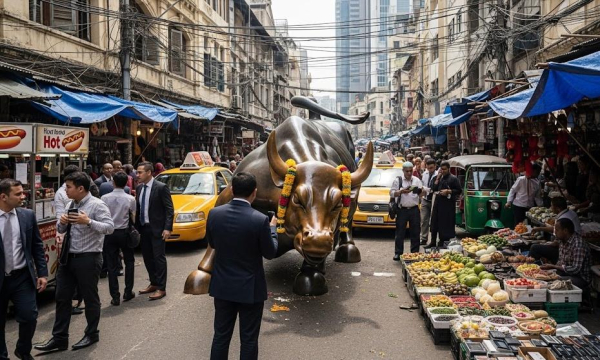This week, Wall Street is buzzing about the decline in the attractiveness of the US stock market, the economic outlook, and company second-quarter financial results. Trade wars are also drawing investors' attention – although it seems apocalyptic scenarios have been avoided, they will still negatively impact the economy.


Euronext CEO: Political instability is harming the United States
There is a growing feeling among investors that it may be time to look for investment opportunities a bit further east – in Europe, away from the volatile America.
Stephane Boujnah, CEO of stock exchange operator Euronext, says that due to political instability, the United States is increasingly resembling, at least in the equity segment, not a developed market but rather an emerging market.
Advertisement See also: Awaken your inner stock market bull! With us, it costs nothing to go overboard.
On the Bloomberg podcast “Merryn Talks Money,” Boujnah said that the rotation of capital from the US to Europe had already begun, but the election of Donald Trump as president significantly accelerated the process.
The weakening dollar and attractive stock valuations have sparked a new wave of interest in Europe.
“Europe is now perceived as a great Switzerland. It's not that everyone is thrilled with the prospects for economic growth in Europe. There's simply a sense that the institutional framework is stable and predictable,” Boujnah said.
Goldman Sachs: Signals from the bond market as before the crisis
Investment strategists at Goldman Sachs are urging clients to hedge riskier trades as corporate bond yield premiums have shrunk to levels not seen since 2007.
With more clarity on U.S. trade policy, and some trading partners reaching tentative agreements on tariffs, “investors are willing to ignore near-term economic weakness as long as recession risks are under control,” the bank's analysts said.
Despite this, the premium on yields on global investment-grade corporate bonds fell to 79 basis points on Thursday. This is the lowest margin that investment-grade companies have to offer investors over similarly rated government bonds with similar maturities since 2007, the eve of the global financial crisis .
“There are enough risks to growth to justify holding hedges in your portfolio. The economic trajectory could surprise negatively,” Goldman Sachs warns.
The bank's economists still expect the US Federal Reserve to cut interest rates by 25 basis points in September, October and December, and to make two more cuts in 2026.
Morgan Stanley: Corporate earnings will push S&P 500 higher
Second-quarter earnings reports from US companies, which are currently being released, point to a “rolling recovery,” according to Morgan Stanley analysts. This could propel the main US stock index to 7,200 points within the next 12 months.
The bank also announces the end of the “rolling profit recession” it identified as beginning in 2022.
“We now appear to be transitioning into a progressive recovery environment, supported by positive cash flows, AI adoption, dollar weakness, tax savings from the OBBBA, a favorable comparison base, cumulative demand across many sectors, and a high probability that the Fed will cut interest rates by the first quarter of 2026,” said Mike Wilson, chief investment officer at Morgan Stanley.
In a bullish scenario, the bank forecasts the S&P 500 index to rise to 7,200 points, or 13.6% compared to Thursday's close.
Burt Malkiel, Princeton University: Stay in the market, even when it's down
Burt Malkiel is a money manager and former economics professor at Princeton University who led Vanguard Group for 28 years. He is the author of the classic finance book “A Random Walk Down Wall Street.”
Now, as stock markets hit all-time highs, the 92-year-old chief investment officer at Wealthfront has issued an open letter explaining why selling stocks amid the declines would be a mistake.
He noted that trying to time a sale and re-enter the market is probably the “biggest unforced investment mistake.” He acknowledged that he understands the emotions associated with watching an investment decline.
– Oh my gosh, I know these emotions, I understand how difficult it is – he admitted, adding, however, that withdrawing from the market would be “always a bad decision.”
The long-term market return is “pretty damn hard to beat,” he noted, adding that believing you know better than everyone else “will probably be a recipe for disaster.”
Fidelity International: Rates Will Fall, Gold Will Gain
Ian Samson, a fund manager at Fidelity International, says the price of gold could reach $4,000 by the end of next year if the US Federal Reserve cuts interest rates to ease the economic slowdown in the country.
The company remains bullish on the metal and has been increasing its position as prices recently fell slightly from record highs.
“The logic behind these actions was that we saw a clearer prospect of a looser Fed policy,” Samson explained in an interview with Bloomberg, adding that some funds had doubled their gold allocations over the past year.
“We may avoid the apocalyptic scenarios that were being painted earlier this year, but ultimately we will see a tax of around 15% imposed on 11% of the US economy, i.e., imports. This can be expected to slow the economy,” he said.
The economic slowdown is believed to prompt the central bank to ease monetary policy and weaken the dollar – both circumstances are usually favorable for gold.
Gold prices have risen by more than 25% this year, driven by the trade war between the US and the rest of the world, geopolitical conflicts, and gold purchases by central banks.
Source: Verslo žinios






